58th Meijin Match Game 5
Black: Sato Yasumitsu, Meijin
White: Maruyama Tadahisa, Challenger
58th Meijin-sen, Game 5, May 31st and June 1st 2000
1.P7g-7f 2/2 0/0
2.P3c-3d 0/2 1/1
3.P2g-2f 1/3 0/1
4.P8c-8d 0/3 1/2
5.P2f-2e 1/4 0/2
6.P8d-8e 0/4 1/3
7.G6i-7h 0/4 0/3
8.G4a-3b 0/4 0/3
9.P2e-2d 0/4 0/3
10.P2cx2d 0/4 0/3
11.R2hx2d 0/4 0/3
12.P8e-8f 0/4 0/3
13.P8gx8f 0/4 0/3
14.R8bx8f 0/4 0/3
15.R2dx3d 11/15 0/3
16.B2b-3c 0/15 0/3
17.R3d-3f 4/19 0/3
18.S3a-2b 0/19 1/4
19.P*8g 0/19 0/4
20.R8f-8e 0/19 0/4
The pivotal game five and again the R8e Yokofudori. Both players stick to
their prepared openings: the R8e Yokofudori in the games where Sato has black,
the Kakugawari opening when Maruyama is black. Sato has no reason to fear
Maruyama's R8e Yokofudori opening. In game 1 he lost, but he should have won,
and in game 3 he overwhelmed Maruyama.
21.R3f-2f 0/19 0/4
22.K5a-4a 0/19 0/4
23.K5i-5h 5/24 0/4
24.S7a-6b 0/24 1/5
25.G4i-3h 3/27 0/5
26.G6a-5a 0/27 2/7
27.S3i-4h 0/27 0/7
28.P7c-7d 0/27 1/8
29.P3g-3f 2/29 0/8
30.P*2e 0/29 2/10
31.R2f-2h 0/29 0/10
32.P*8f 0/29 0/10
33.P8gx8f 0/29 0/10
34.R8ex8f 0/29 0/10
35.P4g-4f 2/31 0/10
36.R8fx7f 0/31 1/11
37.B8hx3c+ 1/32 0/11
38.N2ax3c 0/32 0/11
39.S4h-4g 0/32 0/11
40.P2e-2f 0/32 0/11
41.P*8h 28/60 0/11
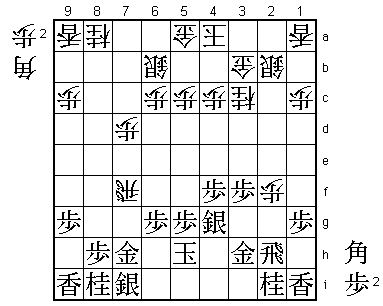
A new move by Sato. In game 1 he played N7g. P*8h is a hard move to play for
a professional as it seems to be a defence only move and it takes away the
possibilities of dropping the pawn higher up the 8th file, like on 8c. Sato
judged that it is more important to defend against a white pawn drop on 8h.
Also, black now threatens to take the pawn on 2f, as B*4d is no longer
effective.
42.P*8g?! 0/60 140/151
Maruyama was clearly surprised by Sato's new move and takes 140 minutes for his
reply. He chooses the sharpest variation, but this game shows that this might
not have been the best choice...
43.P*7g 141/201 0/151
Now Sato takes his time for his reply. "The Meijin wins by one minute" was the
joke in the press room. The people there must have been a little bored waiting
almost five hours for two moves. It is unclear if Sato had not given enough
thought to P*8g in his preparation. The problem is that 43.Px8g Rx7h+ Sx7h
B*8h is good for white. For example R*8b N7c and the white knight is going to
help in attack.
44.R7f-7e 0/201 35/186
It seems like Maruyama had counted on 44.Px8h+ here. However, in the end he
decided that he did not like Px7f (Sx8h R7e looks like the game variation,
but then white has two pawns in hand instead of one) +Px9i N7g +P8i S6h.
Giving up the pawn on 8g that was just dropped so forcefully is not a good
sign.
45.P8hx8g 6/207 0/186
46.R7e-2e 0/207 4/190
47.N2i-3g 6/213 0/190
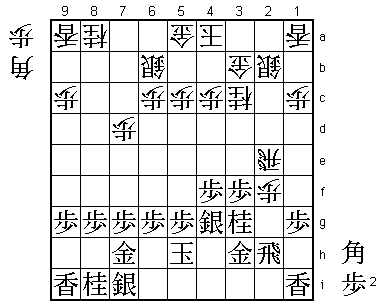
48.P2f-2g+ 0/213 74/264
The sealed move. Maruyama realised that he was in trouble and tries to
complicate things for his opponent.
49.G3hx2g 12/225 0/264
50.P*2f 0/225 2/266
51.N3gx2e 66/291 0/266
52.N3cx2e 0/291 0/266
53.P7g-7f! 0/291 0/266
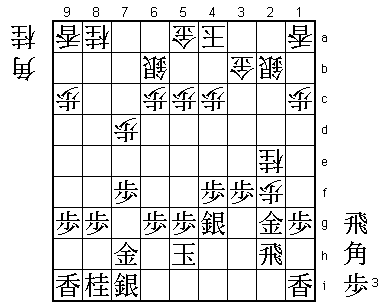
A fine move. The gold on 2g is hanging, but in this case it is better for
black to let it be taken than to save it. Gx2f N3g+ is good for white, while
Px2g+ Rx2g is good for black. An interesting example of how positional
considerations can take preference over material.
54.N8a-7c 0/291 11/277
55.R*8a 29/320 0/277
56.P7d-7e 0/320 40/317
57.B*1e! 41/361 0/317
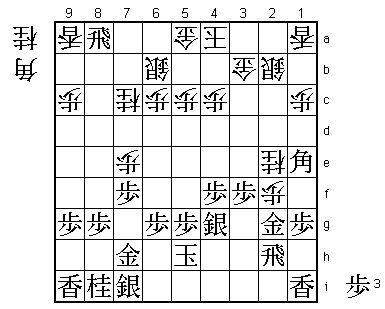
Another good Sato move. This bishop is aiming at the gold on 5a and at the
same time at the pawn on 2f. Now Maruyama is forced to break the status quo
and take the gold.
58.P2fx2g+ 0/361 111/428
59.R2hx2g 0/361 0/428
60.G*3g 0/361 0/428
61.R2gx2e 52/413 0/428
62.G3gx4g 0/413 10/438
63.K5hx4g 0/413 0/438
64.B*9b 0/413 0/438
65.N*7d! 6/419 0/438
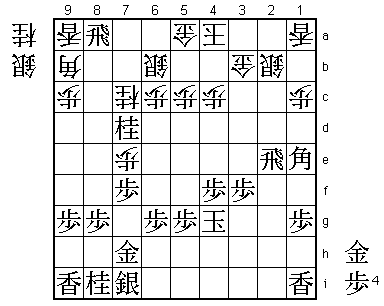
A strong counter to the fork of king and rook. If Maruyama takes the rook,
the games is over after 67.Nx6b+ Gx6b Rx2b+.
66.N*3c 0/419 1/439
Desperate defence.
67.B1ex3c+ 5/424 0/439
68.B9bx7d 0/424 7/446
69.P5g-5f 3/427 0/446
70.S2bx3c 0/427 0/446
71.R2e-2a+ 0/427 0/446
72.N*3a 0/427 6/452
73.P7fx7e! 6/433 0/452
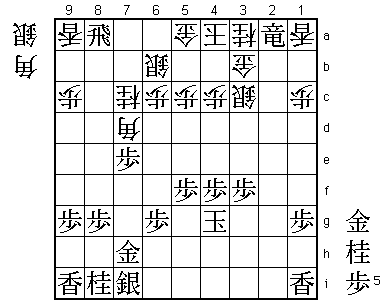
The foundation of the victory. The black king now has a lot of free space on
the left side of the board as it can run to 8h if necessary. White has no
good way to attack.
74.B7dx5f 0/433 14/466
75.K4gx5f 3/436 0/466
76.B*9b 0/436 0/466
There is a saying in shogi that in professional games the player forking
king and rook will lose. If so, Maruyama just lost this game for the second
time...
77.K5f-6f 31/467 0/466
78.B9bx8a 0/467 2/468
79.P*5b! 0/467 0/468
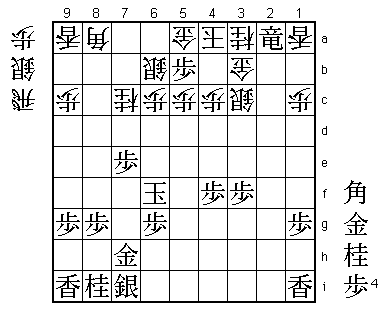
The deciding move.
80.G5ax5b 0/467 1/469
Of course white can not take with the king, as the gold on 3b must be
defended. Maruyama could have resigned here, but plays some quick moves
that have no meaning.
81.G*2c 2/469 0/469
82.G5b-4b 0/469 1/470
83.G2cx3b 1/470 0/470
84.G4bx3b 0/470 0/470
85.G*5b 0/470 0/470
86.K4ax5b 0/470 1/471
87.+R2ax3b 0/470 0/471
88.S*4b 0/470 3/474
89.B*4a 2/472 0/474
90.K5b-6a 0/472 0/474
91.G*8b 1/473 0/474
Resigns 0/473 7/481
Time: 07:53:00 08:01:00
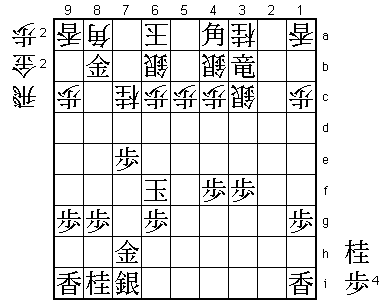
This is not a mating threat yet, but as white has no attack and no defence
against +Rx4b next, Maruyama resigned. A great performance by Sato, who has
completed his comeback from 2-0 down with three consecutive wins. He now
must be considered the clear favourite to get his third consecutive Meijin
title, as he has outplayed Maruyama for most of the match. Will game 4 see
another Kakugawari game, or will Maruyama try something else?







